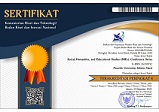The Influence of School Operational Assistance (BOS) Funds on Students’ Literacy and Numeracy: Evidence from Indonesia
Abstract
This study aims to analyze the effect of School Operational Assistance (BOS) fund utilization on students’ literacy and numeracy achievement through learning quality as a mediating variable. The research employs a quantitative approach using school panel data from 2022 to 2024, analyzed through the Fixed Effect Model and mediation analysis. The findings indicate that the utilization of BOS funds has a positive and significant effect on learning quality and directly as well as indirectly enhances students’ literacy and numeracy outcomes. Learning quality serves as a partial mediator that strengthens the relationship between financial support and student achievement. The novelty of this study lies in its integration of the Resource-Based View and Human Capital Theory to explain the mechanism by which financial resources are transformed into educational quality improvement. These results emphasize that the effectiveness of BOS funds depends largely on how they are managed to strengthen the quality of teaching and learning in relation to students’ literacy and numeracy outcomes. The implications of this study contribute to the advancement of educational science, particularly by enriching the understanding of effective educational resource management to improve learning quality and student achievement in Indonesia.
Keywords
Full Text:
PDFReferences
Barney, J. (1991). Firm resources and sustained competitive advantage. Journal of Management, 17(1), 99–120. https://doi.org/10.1093/oso/9780199277681.003.0003
Baron, R. M., & Kenny, D. A. (1986). The moderator–mediator variable distinction in social psychological research: Conceptual, strategic, and statistical considerations. Journal of Personality and Social Psychology, 51(6), 1173–1182. https://doi.org/10.3390/su13084349
Becker, G. S. (1975). Human capital: A theoretical and empirical analysis, with special reference to education. The University of Chicago Press. https://doi.org/10.1001/archneur.1986.00520010054022
Hanushek, E. A., & Woessmann, L. (2008). The role of cognitive skills in economic development. Journal of Economic Literature, 46(3), 607–668. https://doi.org/10.1257/jel.46.3.607
Jackson, C. K., Johnson, C. R., & Persico, C. (2014). The effect of school finance reforms on the distribution of spending, academic achievement, and adult outcomes. NBER Working Paper No. 20118. https://doi.org/10.3386/w20118
Lafortune, J., Rothstein, J., & Schanzenbach, D. W. (2018). School finance reform and the distribution of student achievement. American Economic Journal: Applied Economics, 10(2), 1–26. https://doi.org/10.1257/app.20160567
Musakirawati, M., Lestari, P., & Nurfadillah, D. (2023). Pemanfaatan platform Rapor Pendidikan Indonesia terhadap perencanaan berbasis data. JDMP (Jurnal Dinamika Manajemen Pendidikan), 7(2), 201–208. https://doi.org/10.26740/jdmp.v7n2.p201-208
Nurbani, D., Rahmawati, N., & Fadillah, A. (2024). Studi kasus pemanfaatan Rapor Pendidikan dalam akselerasi kemampuan literasi peserta didik. Didaktika: Jurnal Kependidikan, 13(1), 715–728. https://doi.org/10.58230/27454312.1332
OECD. (2023). Education policy outlook 2023. OECD Publishing. https://doi.org/10.1787/f5063653-en
OECD. (2023). PISA 2022 results (Volume I): The state of learning and equity in education (Factsheets, Vol. I). OECD Publishing. https://doi.org/10.1787/53f23881-en
Rythia Afkar, Fasih, T., & Luque, J. (2020). Indonesia public expenditure review. World Bank. https://www.worldbank.org/en/publication/wdr2018
Sulistyaningrum, E. (2016). Impact evaluation of the school operational assistance program (BOS) using the matching method. Journal of Indonesian Economy and Business, 31(1), 33–62. https://doi.org/10.22146/jieb.10319
Wernerfelt, B. (1984). The resource-based view of the firm. Journal of Management Inquiry, 5(4), 171–180. https://doi.org/10.1177/105649269500400402
World Bank. (2015). Spending more or spending better: Improving education financing in Indonesia (World Bank Publications – Reports 13210). The World Bank Group. https://doi.org/10.1596/978-1-4648-0810-0
World Bank. (2020). The promise of education in Indonesia. World Bank. https://doi.org/10.1596/34807
Refbacks
- There are currently no refbacks.





